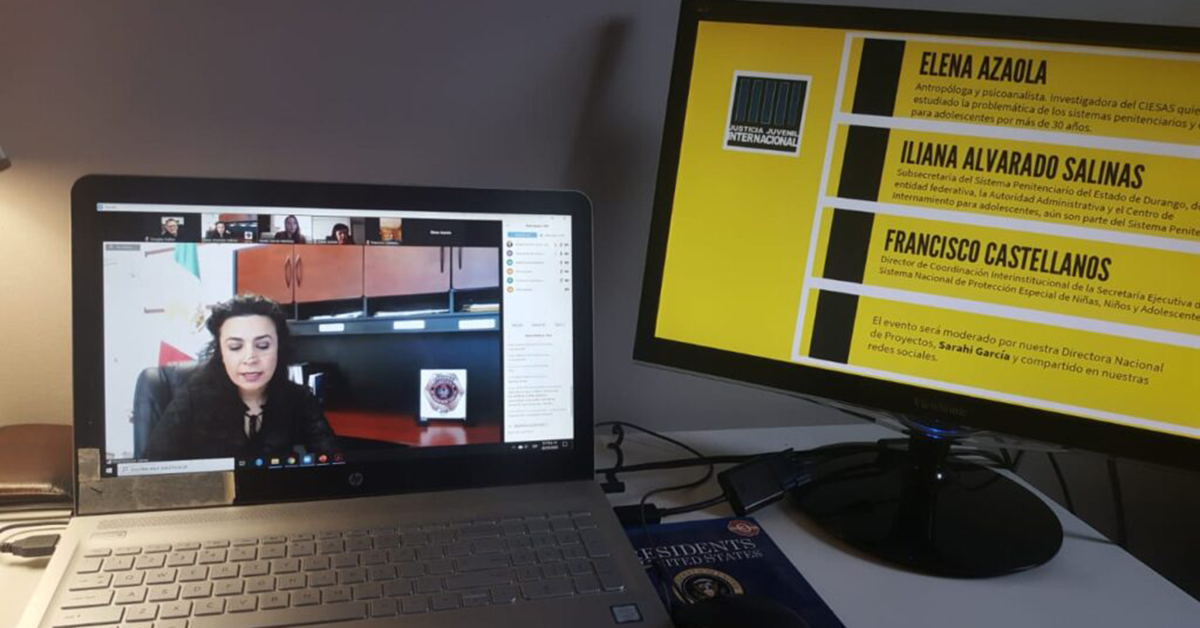It is important that we take care of the mental health of adolescents in detention centers during COVID19, as they are already isolated from society, which is why a pandemic like this can be an opportunity to integrate care measures towards young people, with the agreement of the Undersecretary of the Penitentiary System of the State of Durango, Iliana Alvarado Salinas.
This was one of the opinions shared by our experts at the first Juvenile Justice Advocates International (JJAI) Webinar, entitled “COVID-19: Challenges in the comprehensive adolescent justice system.”
At the event held on the morning of Thursday, March 26, we counted with the presence of Dr. Elena Azaola, anthropologist and psychoanalyst, who is currently a CIESAS researcher. She mentioned that not only do you have to be careful with physical health but also emotional health, and called for the urgency of implementing protocols for young people distressed by the current situation, to avoid increasing the population of the centers temporarily and that those who can bring to completion their detention time in a sped up manner, should be taken into account.
“This is a juncture to request the support of civil society. Outside there are a number of supports that could be done in these difficult times, it only takes an exercise to strengthen ties. I believe that an organized community can do many things, but it has not been sufficiently encouraged to play a more active role”, she added.

During the webinar we also had the participation of the Director of Inter-institutional Coordination of the Executive Secretariat of the National System of Special Protection for Girls, Francisco Castellanos, who said that actions have been taken in order to respect the best interests of adolescents who are in the justice system and that it is necessary to rethink the conditions in which people who have a measure of deprivation of freedom live in, since young people cannot take actions such as the “socially distance themselves” to prevent the spread of COVID-19 in the event of a case being detected in the center where they are located.
The event was moderated by the National Director of Projects of JJAI, Sarahi García,who assured that in the face of a crisis like the present one, it is difficult to build on a system that has been lacking in resources and professionalization of all the competent authorities and that she hopes that the measures of attention to the mental health of adolescents can be transformed into practices repeated.
Among the main collective concerns that were expressed regarding the current situation regarding COVID-19, it was stated that there is a need of the following:
- Appropriate accompaniment for adolescents during the pandemic;
- Taking care of their mental health;
- Physical care to prevent the spread of the virus to the interior of the facilities
- The changes that are made in the centers toward measures carried out due to COVID-19.
Some recommendations made in the webinar:
- Find ways to avoid custodial penalties for the time being;
- Emphasize protocols where mental health is prioritized
- Review what kind of accompaniments currently exist in the detention centers with the adolescents and shift them to become more in line with the law and always based on the best interests of children.
- Highlight the transparency protocols that allow competent authorities such as SIPINNA or the CEDH to have eyes inside the centers.
Read all the recommendations emitted by JJAI here.
It is worth mentioning that this is our first Webinar in a series that we will be conducting with experts in the area, for more information you can follow us on our social networks, or write to info@jjadvocates.org.

